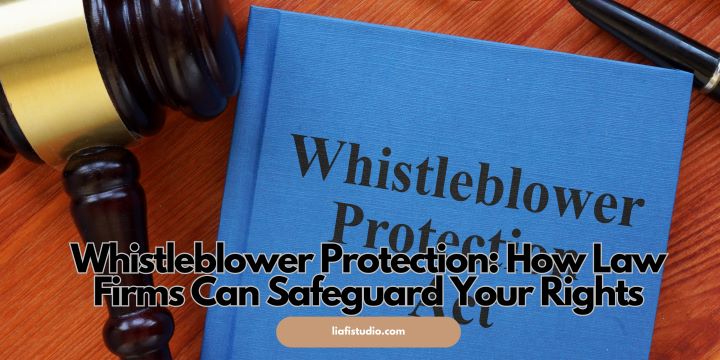Key Takeaways:
- Understanding the essential role of law firms in protecting whistleblowers.
- The complexities and legal nuances surrounding whistleblower cases.
- The measures law firms take to safeguard the rights and identities of whistleblowers.
- A look into the protections offered under various whistleblower laws.
- Insight into the journey of a whistleblower from disclosure to resolution.
The Vital Role of Law Firms in Whistleblower Protection
Whistleblowers are the sentinels of corporate and governmental integrity—individuals who bring attention to misconduct in the interest of public welfare. Their disclosures can trigger large-scale reforms and ensure accountability within powerful establishments. However, whistleblowing is fraught with potential backlash and personal cost. Here, specialized law firms equipped to handle such sensitive cases become invaluable allies to whistleblowers.
Law firms play a multifaceted role in protecting those who dare to expose wrongdoing. From the initial evaluation of the claim to navigating the complex legal landscape of whistleblower laws, attorneys provide the necessary counsel and shield to protect the whistleblower’s rights and interests. This protection extends beyond legal representation, encompassing emotional support, strategic advising, and post-resolution assistance.
Furthermore, law firms with expertise in whistleblower protection often have established networks and relationships with regulatory agencies and advocacy groups, bolstering their ability to advocate effectively for their clients. Their in-depth knowledge of whistleblower laws and precedents allows them to craft robust legal strategies tailored to each unique case. Ultimately, by championing the cause of whistleblowers, these law firms contribute to greater transparency, accountability, and ethical standards in both public and private sectors.
Navigating Legal Complexity: Whistleblower Laws and Rights
Whistleblower laws are a tapestry of federal and state statutes, each tailored to address various forms of misconduct, from fraud and corruption to violations of securities laws and endangerment of public health. Understanding the intricate web of laws, including the False Claims Act, the Dodd-Frank Act, and the Whistleblower Protection Act, can be staggering to the layperson. Specialized attorneys decipher these complexities, ascertain the applicability of laws, and choreograph a legal strategy that aligns with the whistleblower’s circumstances and objectives.
There is also an important distinction between public and private sector whistleblowing, each with its challenges and legal routes. Whistleblowers must navigate confidentiality clauses, non-disparagement agreements, and often an imbalance of power. An experienced whistleblower lawyer can guide the whistleblowers through these snags, educate them on their rights, and advocate.
Safeguarding Identities and Rights: The Function of Legal Counsel
One of the primary concerns for whistleblowers is anonymity. Protecting one’s identity can be the difference between a safe disclosure and one fraught with risk. Law firms adept at whistleblower cases employ strategies to maintain confidentiality, such as making disclosures to governmental entities under the seal. They offer robust counsel on securing documentation and communicating safely while preserving the whistleblower’s rights under state and federal protections.
Moreover, legal counsel acts as a buffer against retaliatory actions, which might be subtle or overt. Lawyers provide a shield against these actions by asserting the whistleblower’s protection under the law and seeking legal recourse when protections are violated. This intermediary role is critical through every stage—pre-filing, post-disclosure, and even after the case resolution.
The Protections Offered Under Whistleblower Laws
Various federal statutes provide a framework to guard whistleblowers. For instance, the Dodd-Frank Wall Street Reform and Consumer Protection Act incentivizes whistleblowers to report securities violations by offering monetary rewards and anti-retaliation protections. Similarly, the Sarbanes-Oxley Act protects employees of publicly traded companies from employer retaliation when they disclose certain types of fraud. Attorneys specializing in this area are familiar with the broad-scope legislative protections and the nuances that apply to specific situations.
With many laws offering provisions for confidentiality and avenues for redress against retaliation, legal experts advise whistleblowers on how to leverage these protections. They play a crucial role in ensuring their clients receive the entitlements promised under the law—for example, reinstatement, back pay, or compensation for legal fees and damages.
The Whistleblower’s Journey: From Disclosure to Resolution
The journey of a whistleblower typically begins with the difficult decision to come forward. Once this decision is made, the individual often experiences a profound sense of uncertainty. Skilled attorneys map out the journey, providing clarity and confidence. They assist in documenting evidence, preparing submissions, and, when necessary, navigating any media attention that may arise.
Throughout the process, from government interviews to potential court appearances, legal counsel is the unwavering advocate for the whistleblower’s cause. Post-disclosure, they continue advising on personal security and career considerations and manage ongoing litigation or investigations. The journey culminates in the case’s resolution and restoring the individual’s peace of mind and closure.
Fostering a Culture of Integrity: The Broader Impact of Whistleblowing
Whistleblower cases often have ramifications beyond the individual and the organization in question. They can signal a broader cultural shift towards transparency and integrity in both the public and private sectors. Law firms help shape this culture by championing whistleblower cases and fostering an environment where ethical breaches are exposed rather than suppressed.
Therefore, the work of these attorneys extends into the realm of societal impact. By representing whistleblowers, legal professionals construct an ethical business landscape where transparency and honesty are valued. The ripple effects of their work encourage others to speak up, promote reform, and contribute to a just and accountable society.
Conclusion
Whistleblower protection is a complex and ever-evolving practice that requires expertise, diligence, and a dedication to justice. Law firms that protect whistleblowers are not just legal advocates but strategic partners in pursuing integrity. Their work safeguards individuals brave enough to speak out while contributing to the broader mandate of corporate and governmental accountability.
In an environment that often discourages transparency, protecting whistleblowers’ rights is a testament to the belief that one person’s courage can make a difference. Legal professionals in this field serve the public interest by upholding the rule of law and ensuring that those who expose wrongdoing have a fighting chance at justice.








